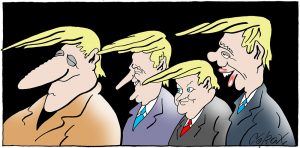Podiumsdiskussion mit Ellen Bos und Daniel Göler, Andrássy Universität Budapest, 19.5.2017
Die Wahl des neuen amerikanischen Präsidenten bedeutet eine Zäsur für die Europäische Union, weil Donald Trump im Wahlkampf und vor seiner Amtseinführung die Fundamente der transatlantischen Kooperation in Frage gestellt hat. In seiner Kampagne gegen das Washingtoner Establishment erklärte Trump die NATO für obsolet und die EU für gescheitert, unterstützte EU-Gegner und begrüßte das britische Austrittsreferendum, lehnte das transatlantische Freihandelsabkommen TTIP ab und kündigte einen Ausstieg aus dem Pariser Klimaschutzabkkommen an.




